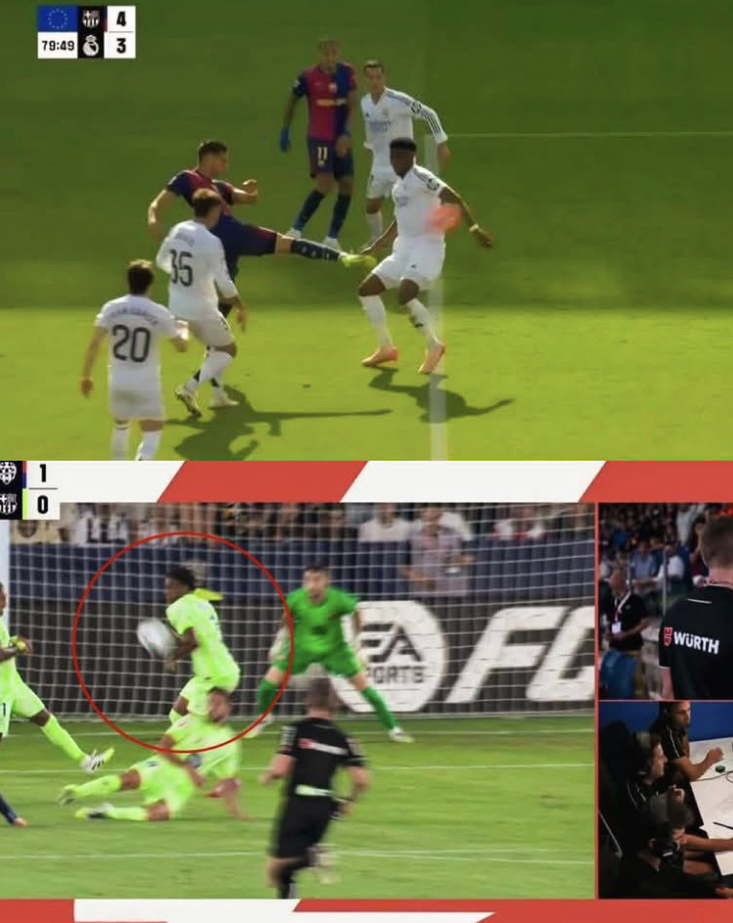Controversy Surrounding Referee Decisions
The controversy surrounding Hernández Hernández’s decisions didn’t stop there. A penalty awarded for Alejandro Balde’s handball sparked debate, with many questioning the consistency of VAR decisions. The VAR audio revealed that the referee reviewed the incident and deemed it a penalty, although Balde’s arm was close to his body. This decision has been disputed, with many arguing that it was excessively harsh.
Pedri’s comments in the post-match interview added fuel to the fire, as he questioned the criteria consistency in VAR decisions. He suggested that decisions like these “should be explained properly for everyone” to maintain transparency and trust in the refereeing process. This highlights the need for clear communication and consistency in refereeing decisions.
VAR Decision-Making Process
The VAR decision-making process has come under scrutiny, with many arguing that the penalty awarded against Balde was not justified. The Royal Spanish Football Federation (RFEF) released the VAR audio, which showed that the VAR official, Jorge Figueroa, recommended a review of the potential penalty for handball. After reviewing the incident, Hernández Hernández awarded the penalty, stating that Balde’s hand was “quite separated” from his body.
This decision has raised questions about the consistency and accuracy of VAR decisions. The use of VAR is intended to improve the accuracy of refereeing decisions, but in this case, it seems to have added to the controversy. The lack of transparency and clarity in VAR decisions can lead to confusion and frustration among players, coaches, and fans.
Impact on the Game
The penalty awarded against Balde had a significant impact on the game. Levante scored from the penalty spot, which potentially changed the course of the game. Barcelona’s subsequent comeback and victory were impressive, but the controversy surrounding the penalty decision lingered.
The impact of refereeing decisions on the game cannot be overstated. A single decision can change the momentum of the game and affect the outcome. In this case, the penalty decision added to the drama and tension of the match, making it an even more intense and unpredictable encounter.
Referee Positioning
Hernández Hernández’s positioning in Levante’s defensive line has also been criticized. Obstructing passing lanes and blocking shooting angles can significantly impact the game’s flow and fairness. Referees need to be aware of their positioning and ensure that they are not interfering with the game.
The referee’s positioning can also affect their decision-making. If they are not in the best position to view the play, they may make incorrect decisions or miss crucial incidents. In this case, Hernández Hernández’s positioning may have contributed to the controversy surrounding the penalty decision.
Conclusion
In conclusion, the controversy surrounding Referee Alejandro Hernández Hernández’s positioning and decision-making in the match between Levante and Barcelona has sparked debate among fans. The penalty awarded for Alejandro Balde’s handball has been disputed, with many questioning the consistency of VAR decisions. The VAR decision-making process has come under scrutiny, and the impact of refereeing decisions on the game cannot be overstated.
The need for clear communication and consistency in refereeing decisions is essential. Referees need to be aware of their positioning and ensure that they are not interfering with the game. The use of VAR should improve the accuracy of refereeing decisions, but it requires transparency and clarity to maintain trust and credibility.
The Future of Refereeing
The future of refereeing in football will likely involve continued improvements in technology and training. The use of VAR will become more widespread, and referees will need to adapt to new systems and protocols. The key to successful refereeing is consistency, transparency, and accuracy.
Referees will need to be trained to use VAR effectively and make accurate decisions. The communication between referees and VAR officials will be crucial in ensuring that decisions are made correctly and consistently. With the right training and technology, referees can improve the accuracy and fairness of their decisions.
The Role of VAR
VAR has the potential to revolutionize refereeing in football. By providing an additional layer of scrutiny, VAR can help referees make accurate decisions and reduce controversy. However, the use of VAR requires careful consideration and implementation.
The VAR system needs to be transparent and consistent, with clear protocols and guidelines for referees and VAR officials. The communication between referees and VAR officials should be clear and concise, ensuring that decisions are made accurately and consistently.
In conclusion, the controversy surrounding Referee Alejandro Hernández Hernández’s positioning and decision-making highlights the need for continued improvement in refereeing. With the right training, technology, and protocols, referees can improve the accuracy and fairness of their decisions, ensuring a more enjoyable and competitive game for all.


